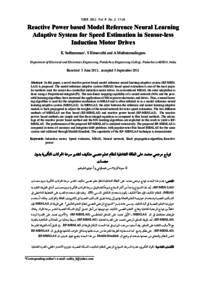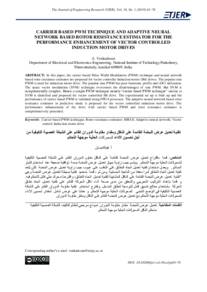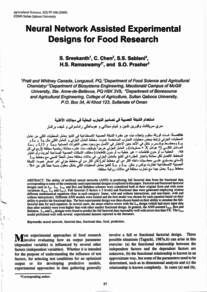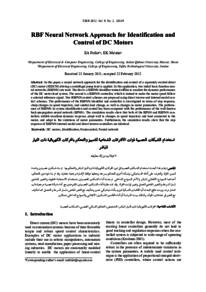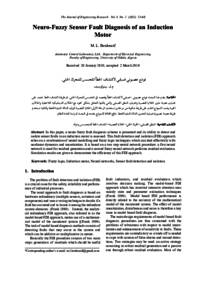Document
Reactive power based model reference neural learning adaptive system for speed estimation in sensor-less induction motor drives.
Contributors
Himavathi, S., Author
Muthuramalingam, A., Author
Publisher
Sultan Qaboos University
Gregorian
2012
Language
English
Subject
English abstract
In this paper, a novel reactive power based model reference neural learning adaptive system (RP-MRN-LAS( is proposed. The model reference adaptive system (MRAS) based speed estimation is one of the most popular methods used for sensor-less controlled induction motor drives. In conventional MRAS, the error adaptation is done using a Proportional-integral-(PI). The non-linear mapping capability of a neural network (NN) and the powerful learning algorithms have increased the applications of NN in power electronics and drives. Thus, a neural learning algorithm is used for the adaptation mechanism in MRAS and is often referred to as a model reference neural learning adaptive system (MRNLAS). In MRNLAS, the error between the reference and neural learning adaptive models is back propagated to adjust the weights of the neural network for rotor speed estimation. The two different methods of MRNLAS are flux based (RF-MRNLAS) and reactive power based (RP-MRNLAS). The reactive power- based methods are simple and free from integral equations as compared to flux based methods. The advantage of the reactive power based method and the NN learning algorithms are exploited in this work to yield a RPMRNLAS. The performance of the proposed RP-MRNLAS is analyzed extensively. The proposed RP-MRNLAS is compared in terms of accuracy and integrator drift problems with popular rotor flux-based MRNLAS for the same system and validated through Matlab/Simulink. The superiority of the RP- MRNLAS technique is demonstrated.
Member of
ISSN
1726-6742
Resource URL
Citation
Sedhuraman, K., Himavathi, S., & Muthuramalingam, A. (2012). Reactive power based model reference neural learning adaptive system for speed estimation in sensor-less induction motor drives. The Journal of Engineering Research, 9 (2), 17-26.
Arabic abstract
يقدم هذا البحث نموذج مرجعي معتمد على الطاقة التفاعلية لنظام تعلم عصبي متكيف لتقدير سرعة المحركات التأثيرية بدون مجسات (RP - MRN – LAS). يعد هذا النموذج واحدة من أكثر النماذج شیوعا للتحكم في سرعة المحركات التأثيرية بدون مجسات. أما في الطريقة التقليدية (MRAS) للنظام المتكيف فإن خطأ التكيف يكون باستخدام التكامل النسبي (PI). وعليه فإن استخدام القدرة على التخطيط اللاخطي في الشبكات العصبية واستخدام خوارزمية التعلم الفعالة يؤدي إلى زيادة تطبيق الشبكات العصبية في إلكترونيات الطاقة والحركات. وهكذا تستخدم خوارزمية التعلم العصبية في آلية التكيف وتسمى عادة باسم "النموذج المرجعي العصبي النظام التعلم التكيفي". ففي طريقة ال MRNLAS فإن الخطأ بين نموذج المرجعية المفاعلية ونماذج التعلم العصبي المتكيف يتم توزيعها من أجل تعديل أوزان الشبكة العصبية لتقدير سرعة المحرك. وهناك طريقتان مختلفتان في ال MRNLAS، الأولى تعتمد على التدفق المغناطيسي (RF – MRNLAS) والأخرى تعتمد على القدرة المرتدة (RP - MRNLAS). تعد طريقة التدفق المرجعي المعتمد على القدرة المفاعلية (RP – MRNLAS) بسيطة وخالية من المعادلات التكاملية بالمقارنة مع الأساليب القائمة على التدفق . وقد أستفيد من هذه الميزات في هذا البحث لابتكار طريقة ال RP - MRNLAS. وتم تحليل أداء الطريقة المقترحة (RP - MRNLAS) على نطاق واسع. كما تمت مقارنة الطريقة المقترحة من حيث دقتها ومشاكل انحراف تكاملها مع طريق ال RF - MRNLAS لنفس النظام والتحقق من صحتها باستخدام برنامج ال Matlab / Simulink. من هذا البحث يتضح تفوق تقنيات ال .RP - MRNLAS
Category
Journal articles

